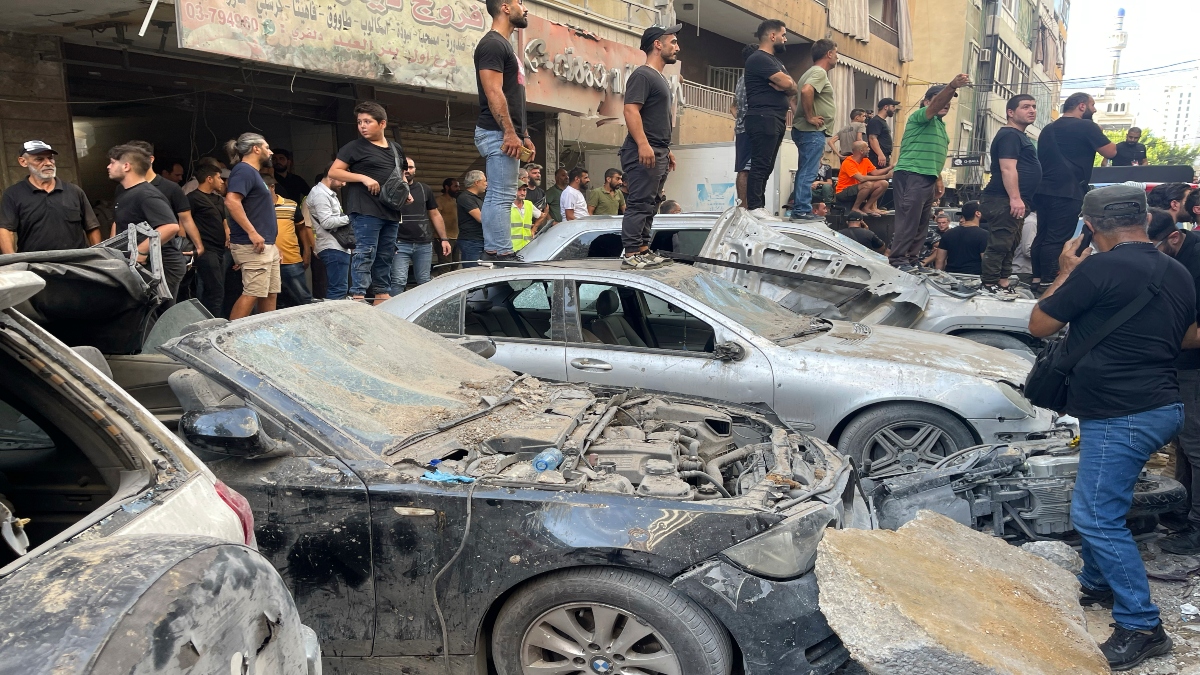Hours after Hezbollah pounded northern Israel with 140 rockets following a vow by the militant group’s leader Hassan Nasrallah to retaliate against Israel for a mass bombing attack, Israeli on Friday hit a Beirut suburb with an airstrike, killing eight people, including a top Hezbollah commander, and injuring 59.
Confirming the attack, Lebanon’s health ministry said the strike killed three people, with a source close to Hezbollah earlier saying a top commander was among the dead.
“The Israeli enemy’s strike on Beirut’s southern suburbs led, according to a preliminary toll, to the killing of three people, and Lebanese hospitals have received 17 wounded so far,” AFP quoted the ministry as saying.
Requesting anonymity to discuss sensitive matters, the Hezbollah source said the Israeli strike on Hezbollah’s stronghold in south Beirut killed the head of the group’s elite Radwan unit, Ibrahim Aqil.
Israel had earlier announced that it had conducted a “targeted strike” in Beirut, but didn’t immediately specify the target in Beirut’s crowded southern suburbs, where Lebanon’s Hezbollah militant group holds sway.
The strike in Dahiyeh, just kilometers from downtown Beirut, hit during rush hour, as people were leaving work and students headed home from school.
The air strike is the third to hit the southern suburbs of Beirut since the start of the Israel-Hamas war on October 7, with the focus of the violence shifting dramatically this week from Gaza to Lebanon.
Impact Shorts
More ShortsStrikes blamed on Israel killed a top commander of Hezbollah, Fuad Shukr, in July, and a leader of allied Palestinian militant group Hamas, Saleh al-Aruri, in January.
The Friday’s strike came after Hezbollah pounded Israel with 140 rockets, which the Israeli military said came in three waves targeting sites along the ravaged border with Lebanon.
Following the attacks, the Israeli military said that it had struck areas across southern Lebanon targeting Hezbollah infrastructure, but didn’t provide details of damage.
Hezbollah said that its attacks had targeted several sites along the border with Katyusha rockets, including multiple air defense bases as well as the headquarters of an Israeli armored brigade they said they’d struck for the first time.
The Israeli military said that 120 missiles were launched at areas of the Golan Heights, Safed and the Upper Galilee, some of which were intercepted. Fire crews were working to extinguish blazes caused by pieces of debris that fell to the ground in several areas, the military said.
The military didn’t say whether any missiles had hit targets or caused any casualties.
Another 20 missiles were shot at the areas of Meron and Netua, and most fell in open areas, the military said, adding that no injuries were reported.
Hezbollah said that the rockets were in retaliation for Israeli strikes on villages and homes in southern Lebanon, not two days of attacks widely blamed on Israel that set off explosives in thousands of Hezbollah pagers and walkie-talkies.
On Thursday, Israel said its military had struck “hundreds of rocket launcher barrels" in southern Lebanon, saying that they “were ready to be used in the immediate future to fire toward Israeli territory”
The army also ordered residents in parts of the Golan Heights and northern Israel to avoid public gatherings, minimize movements and stay close to shelters in anticipation of the rocket fire that eventually came Friday.
Hezbollah and Israel have exchanged near-daily fire since October 8, a day after the Israel-Hamas war’s opening salvo, but Friday’s rocket barrages were heavier than normal.
Nasrallah on Thursday vowed to keep up daily strikes on Israel despite this week’s deadly sabotage of its members’ communication devices, which he described as a “severe blow.”
At least 20 were killed in the attacks and thousands were wounded when pagers, walkie-talkies and other devices exploded in Lebanon on Tuesday and Wednesday.
The sophisticated attacks have heightened fears that the cross-border exchanges of fire will escalate into all-out war. Israel has neither confirmed nor denied involvement in the attacks.
In recent days, Israel has moved a powerful fighting force up to the northern border, officials have escalated their rhetoric, and the country’s security Cabinet has designated the return of tens of thousands of displaced residents to their homes in northern Israel an official war goal.
)